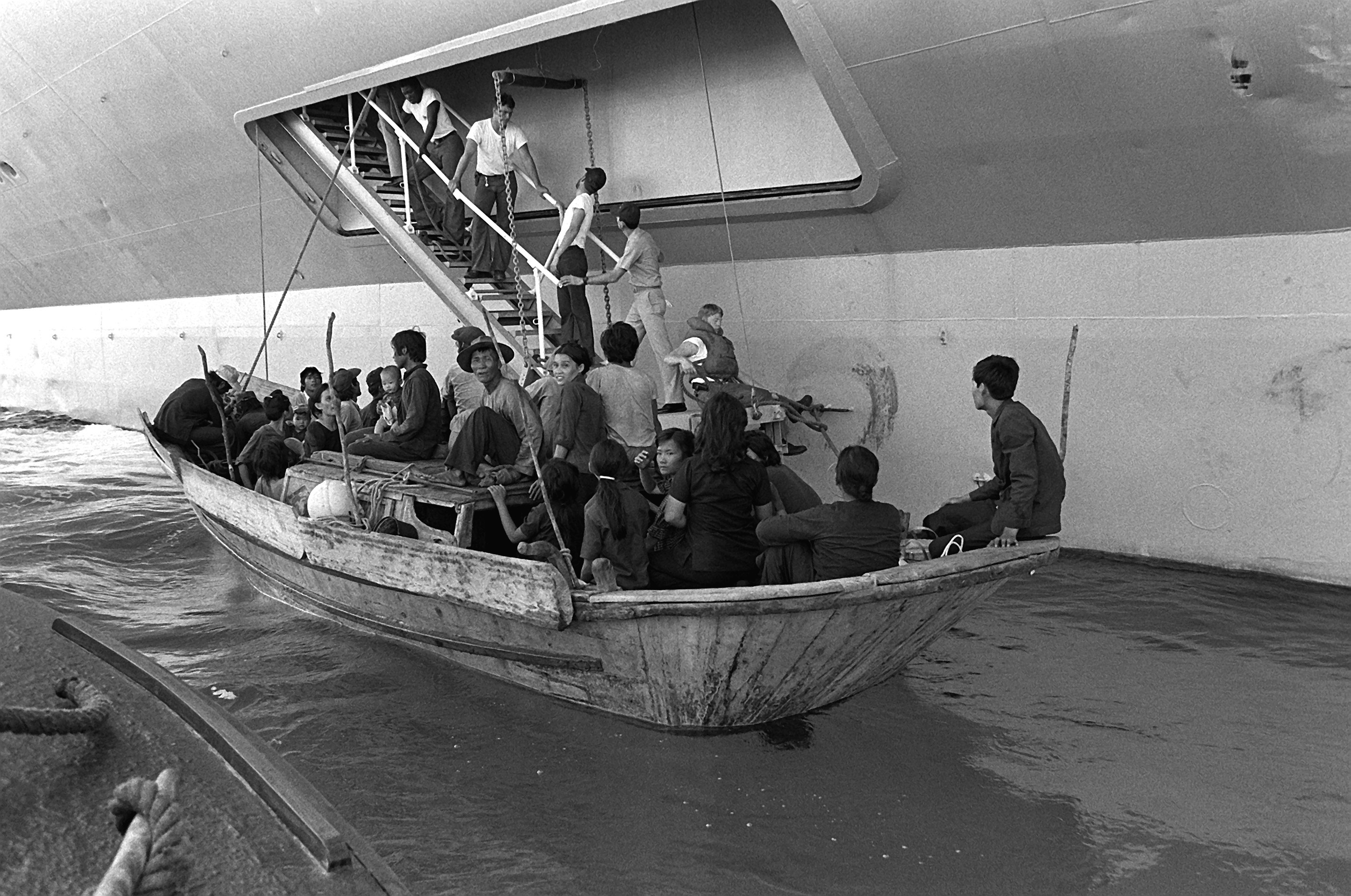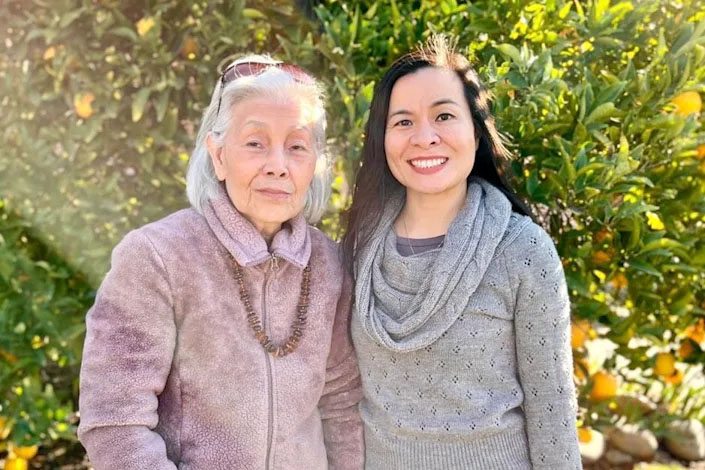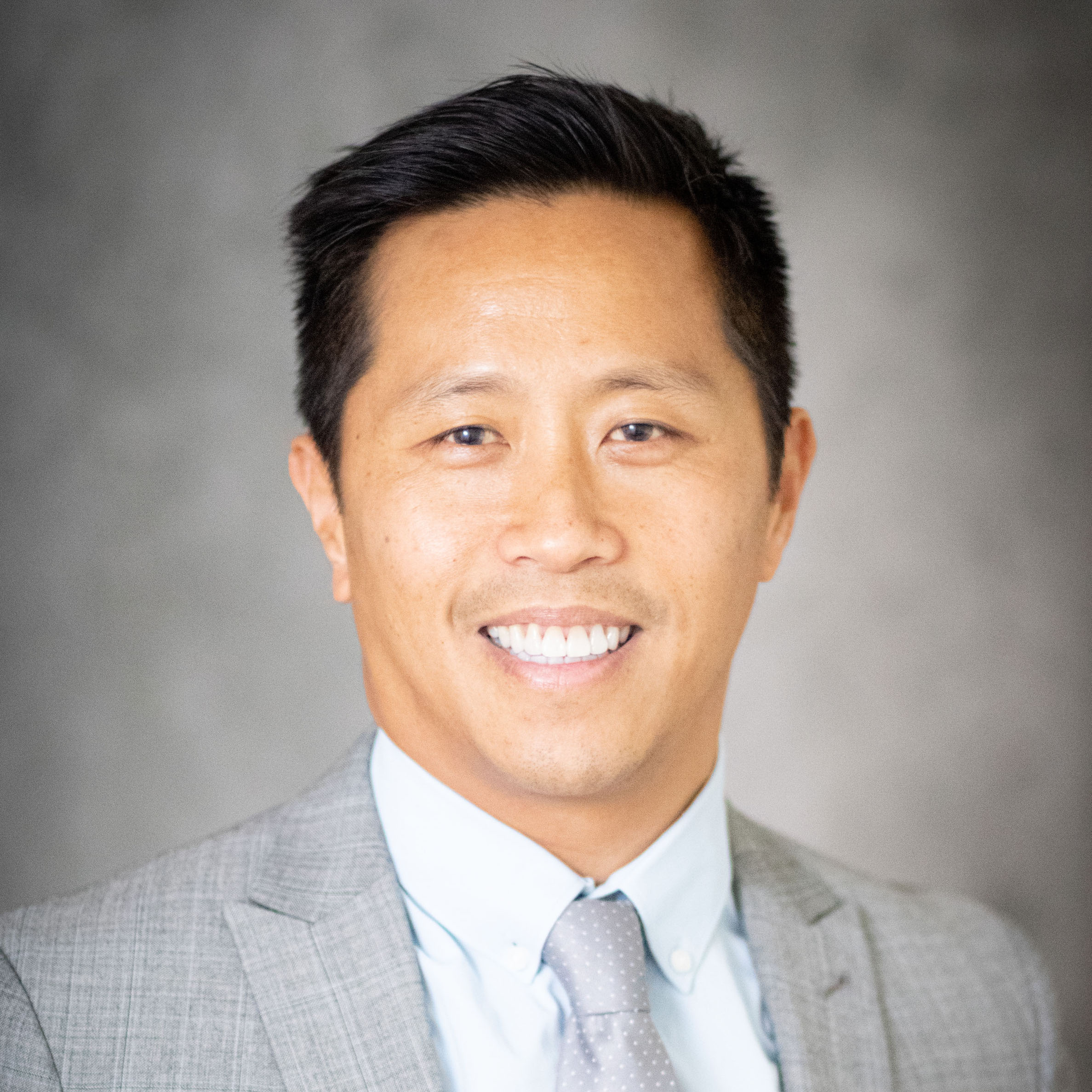
Since the fall of Saigon in 1975, more than 1.2 million Southeast Asian refugees and immigrants have resettled in the U.S. Many of them have experienced significant trauma. Now, many Vietnamese refugees in the U.S. are at ages where they’re beginning to develop dementia. But like other underrepresented groups in the U.S., they also face barriers to seeking treatment for trauma and dementia. In this episode of Unfold, we talk to a UC Davis researcher embarking on the first long-term study examining early life contributors to dementia in Vietnamese American communities.
In this episode:
Oanh Meyer, social psychologist at Alzheimer's Disease Center at UC Davis Health
Duy Nguyen, former child refugee from Vietnam, recent graduate of UC Davis School of Medicine and psychiatry resident at UCSF Fresno


Transcript
Transcriptions May Contain Errors
Marianne Russ Sharp
In 1975, the South Vietnamese capital of Saigon fell to the communist North Vietnamese Army, effectively marking the end of the Vietnam War
Historical News Clip
Saigon April 30. Eight o'clock, the last American helicopter on the roof of the American Embassy prepares to lift off the last of the evacuees fleeing before the advancing communist armies.
Historical News Clip
The people here were herded into groups, all they could take was hand luggage. Fifty at a time they took off for the carrier's waiting in the South China Sea.
Amy Quinton
These TV news clips captured the mood during the fall of Saigon. The story we're about to unfold begins shortly after with the historic displacement and migration that followed.
Historical News Clip
Today the UN High Commission of Refugees called the situation an appalling human tragedy.
Historical News Clip
They are arriving at the rate of 1000 per day. Vietnamese and ethnic Chinese who say they'd rather pay $2,000 a piece to their government and risk the high seas then live and work in a labor camp.
Historical News Clip
This is the east coast of Malaysia. Final destination for thousands of refugees fleeing Vietnam. Many don't make it this far. They're attacked by pirates, drown or starve to death.
Historical News Clip
We people we are being treated just like animals, not like a human beings.
Marianne Russ Sharp
125,000 Vietnamese refugees came to the US in 1975. By 2010, more than 1.2 million Southeast Asians had resettled in the United States as a result of the Vietnam War. That made them the largest refugee group in the country.
Amy Quinton
We're going to hear from one of those refugees in this episode of Unfold.
Marianne Russ Sharp
As you might imagine, the trauma that comes from war and displacement is profound.
Amy Quinton
Trauma affects the brain. It can lead to depression, anxiety, and other medical conditions. And a growing body of evidence suggests a link to dementia in old age.
Marianne Russ Sharp
Oanh Meyer is a social psychologist in the Department of Neurology at UC Davis Health. She's researching the link between wartime trauma and dementia in Vietnamese American communities.
Oanh Meyer
We want to be able to understand what's the prevalence of dementia in this group that's, you know, exposed to all of this trauma? What's the relationship between early life adversity and trauma and dementia? And what are those pathways? What are the processes that link early life trauma to current dementia?
Amy Quinton
Meyer has a personal connection to the research. Her mother who fled Vietnam as a refugee in 1975 now has dementia. Many Vietnamese Americans who experienced the war and its aftermath are reaching older ages when symptoms of dementia may begin to appear.
Marianne Russ Sharp
We're going to dive deeper into the issue of trauma and dementia in Vietnamese American communities and look at why there are barriers in seeking treatment.
Amy Quinton
And you'll hear stories of survival and resilience. Coming to you from UC Davis
Marianne Russ Sharp
and UC Davis Health,
Amy Quinton
This is Unfold, a podcast that breaks down complicated problems and unfolds curiosity driven research. I'm Amy Quinton. And I'm Marianne Russ Sharp.
Marianne Russ Sharp
Those historic news clips about the Vietnamese refugees who fled their country after the war very powerful.
Amy Quinton
Yeah, and I remember some of those stories too.
Marianne Russ Sharp
Really
Amy Quinton
Yeah, while I was a child when Saigon fell, I remember hearing about the Vietnamese boat people. Almost 2 million Vietnamese risked their lives on the open sea between the fall of Saigon until the early 1990s.
Marianne Russ Sharp
And as we heard in those news clips, many did not make it to other countries.
Amy Quinton
One Vietnamese refugee who did is a recent UC Davis School of Medicine graduate. He's also an aspiring psychiatrist.
Duy Nguyen
I'm Duy Nguyen, Duy by uh people who are Vietnamese.
Amy Quinton
Would you rather me say Duy?
Duy Nguyen
No, I like Duy.
Amy Quinton
You like Duy?
Duy Nguyen
Yeah. Duy is I feel a fun name? Yeah. So I've always enjoyed it.
Amy Quinton
That's great. Duy was born in Ho Chi Minh City, formerly Saigon in 1976. He says his memories of his time there are spotty, but he does remember that it was a constant struggle.
Duy Nguyen
Because after the war, the economy collapsed. And so money and getting food on the table was on everybody's mind. I remember always a conversation is oh, if we had meat, that was a special occasion. But it was such that doctors starved. That was kind of one of the mottos. And so many parents, even though they didn't face immediate persecution, felt that their children had no future.
Marianne Russ Sharp
When she was just 18, Duy's mother tried to escape the country, but failed. Over the next several years, she would try six more times.
Duy Nguyen
And this is on the tail of us having lost two people to the escape. My uncle, my aunt, my uncle was imprisoned and died in prison. My aunt was on the boat and her boat capsized and she drowned.
Marianne Russ Sharp
Duy would join his mother on her seventh attempt at escape in 1983. Smugglers led them along with Duy's other aunt and dozens of others to a boat just offshore.
Amy Quinton
Duy, then just five years old, says mostly he remembers darkness.
Duy Nguyen
It's pitch black, where you could not see your hands.
Amy Quinton
He says the boat seemed hundreds of feet away from the shore. The water was shallow for an adult, but deep for a child. And waves made it difficult for everyone.
Duy Nguyen
I couldn't make it. I was too small. And we were trying to thwart across the waves to get to the boat. Um, and the only reason why I was able to make it was because a stranger, another person who had gone on this, one of the refugees, decided just to put me on his shoulder and take me to the boat.
Marianne Russ Sharp
Later, he realized that the darkness may have kept his family together.
Duy Nguyen
When I got on. My mother said like later she and my aunt were able to reach the boat, but they were too weak to pull themselves up. Right so they would have been left, left behind because they was leaving. And the only reason they made it on was because another family have mistaken them in the pitch black for one of their family members. And so hauled them on to the boat.
Amy Quinton
The captain was to guide the boat to the Philippines, bound for the American Embassy in Manila. They ran out of fuel and drifted for two weeks.
Marianne Russ Sharp
Duy also remembers the darkness from the hull of the boat where he and about 40 others crammed together shoulder to shoulder for the entire journey.
Duy Nguyen
The hatch, that would be the only source of light and air I guess, would open and a hand would scoop down with a jug of milk. And all the kids would be like "Give me the milk!" They would scramble to get to the most strategic spot so the guy could, you would get the most amount of milk that would be poured into your mouth.
Amy Quinton
Eventually they drifted onto the shores of Malaysia, just like the refugees we heard about in the news clips.
Duy Nguyen
I remember that very well let because we were hauled into Malaysia, you know by gunshots. I just remember waking up one morning like in the hull of this boat and hearing gunshots and you know peeking over. There were Malaysian coast guards kind of shooting at us and saying "You better come in or we're going to shoot you down."
Marianne Russ Sharp
They ended up in jail briefly while in Malaysia. And then at some point he remembers living in the jungle.
Duy Nguyen
There was a hut. We had no running water. You know, we bathe we would climb like the hills to this little waterfall. There was a hurricane one day, and our hut was blown over. Now that episode, like I asked my mom and she just again, she refuses to kind of really tell me like exactly how everything fits together. But she would just say, "Oh, that time." You know? And she would just kind of stop talking about it.
Amy Quinton
Duy says they would eventually board a boat and make it to the Philippines where they would spend time in a refugee camp before resettling in the US. He apologizes for not remembering more of the year it took them to finally reach the states.
Duy Nguyen
I'm sorry that it's so spotty. My narration to you, you know, because also the adults in my family kind of refuse to talk about it.
Amy Quinton
Why?
Duy Nguyen
It's painful. Yeah, it's just it's very painful for them. Unlike me, you know, because I was young. They lost a whole way of life. Right? I mean, that's, that's one huge loss. But then to go on this one year, life and death struggle in the elements is another crazy trauma.
Marianne Russ Sharp
The trauma unfortunately doesn't end there. For refugees, it's followed by the trauma of adjusting to a new country, a new way of life and a new language.
Amy Quinton
Duy is open to talking about his experience as a refugee, but he thinks most Vietnamese refugees, like his mother, are not.
Duy Nguyen
What's the first thing that people do when they're hurt so terribly? They deny it. And that's just an indication that it was so damaging that they don't know how to deal with it. And that leads to worse consequences. That leads to PTSD. It leads to psychosis. It can lead to violence towards others.
Marianne Russ Sharp
Duy says it helps him to tell his story. He believes if he doesn't process the trauma, it will get worse as he ages.
Amy Quinton
Oanh Meyer, the UC Davis social psychologist we mentioned earlier, is researching whether Vietnamese Americans are more at risk of developing dementia. Her interest in studying this connection began several years ago while researching the health of caregivers.
Oanh Meyer
And then when I started interviewing Vietnamese caregivers, who were taking care of family members with dementia and just sort of out of, you know, spontaneous conversations, they started reliving some of this trauma that either they had faced or their loved ones who they were caring for had faced.
Marianne Russ Sharp
Around the same time her mother, a Vietnamese refugee, started showing signs of dementia.
Oanh Meyer
She started repeating the same questions over and over telling the same stories over and over.
Amy Quinton
During the early stages of dementia. Long term memories are still present. For Meyer's mom, those memories were from her time growing up in northern Vietnam.
Marianne Russ Sharp
Meyer says her mother, when she was still cognitively healthy, told her stories about having to find a safe place away from constant bombing.
Oanh Meyer
She always had to run underground to to hide and her family and her class mates. And so she always would tell us stories about getting hurt. And in fact, at one point, she had run underground and there was something like a stick or some sort of wire that that she ran into. And it hit her the inside of her eye and she actually has a scar from that time.
Amy Quinton
Meyer's mother had to be vigilant in Vietnam. And Meyer says it's not unusual for people experiencing dementia to relive moments from decades earlier.
Oanh Meyer
Part of the earlier signs for her were just these extreme bouts of paranoia about communist soldiers wanting to come into our home and hurt her. And she's always pulling the blinds shut and just very paranoid. And so it made me think about just those traumatic experiences that she grew up with in Vietnam throughout the wars, and then coming to the US.
Oanh Meyer
She's embarking on an investigation to track the cognitive health of more than 500 aging Vietnamese Americans in Northern California.
Oanh Meyer
And we'll follow them for several years to look at their prevalence as well as whether or not those who experience early life trauma and adversity, whether it was in Vietnam, or in the process of coming to the US, whether those experiences are related to their cognition now.
Amy Quinton
Researchers have not yet studied dementia in the Vietnamese American population here, which is surprising given that California is home to nearly 40% of the 1.4 million Vietnamese immigrants now in the country.
Marianne Russ Sharp
Meyer says refugees are disproportionately affected by health and mental health disparities. She wants to change that. But it's not an easy community to study.
Oanh Meyer
There really are not a lot of culturally and linguistically appropriate testing materials and assessments, or staff, you know, who, who can address the needs of this population.
Marianne Russ Sharp
But just as Duy suggested, there is also a reluctance within the Vietnamese American community to talk about these health issues.
Oanh Meyer
Yeah, there's certainly I think, a stigma, not only just with trauma, but with mental health and dementia. But I think what we're finding is that when we as researchers and staff really make an effort to care about these stories, that people actually are willing to share them.
Amy Quinton
And she says it's important they share not just for their own mental health, but also for what their stories can teach us.
Oanh Meyer
There's so much to learn from this group about not only risk factors, but resilience. So we know that a lot of them face these, these challenging circumstances, but not all go on to develop and health problems or cognitive impairment. So we can look at what are the factors that might help them to be resilient against, you know, poor health.
Marianne Russ Sharp
Understanding those factors could also provide guidance to help other war refugees, like Ukrainians and Afghans who are relocating to the US.
Amy Quinton
Many refugees like Duy Nguyen and his mother have had to overcome adversity, even once they made it to the US. Duy wants people to see the refugees' story as one of resilience.
Duy Nguyen
I hope the main message, one of the main messages, I can tell people if you want to help a refugee, besides just helping them with basic necessities, one of the things is to see them through the lens of resilience and not of tragedy. And I ask that people who look at refugees to not see us as others, but to see us as you.
Marianne Russ Sharp
And Oanh Meyer says she hopes her study is the first of many to engage a group that's typically excluded from research to help us understand the connection between trauma and dementia.
Amy Quinton
And to help us all understand each other.
Marianne Russ Sharp
You can learn more about Oanh Meyer's research on our webpage and listen to previous episodes at ucdavis.edu/unfold. I'm Marianne Russ Sharp.
Amy Quinton
And I'm Amy Quinton. Thanks for listening.
Amy Quinton
Unfold is a production of UC Davis. Original music for Unfold, comes from Damien Verrett and Curtis Jerome Haynes. Additional music comes from Blue Dot sessions.
Amy Quinton
If you liked this podcast, check out UC Davis' other podcast, The Backdrop. It's a monthly interview program featuring conversations with UC Davis scholars and researchers working in the social sciences, humanities, arts and culture. Hosted by public radio veteran Soterios Johnson. The conversations feature new work and expertise on a trending topic in the news, subscribe wherever you get your podcasts.